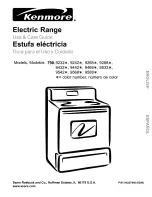
Part # 4523104 Rev 3 (03/04/10)
Page 12
General
The range is the workhorse of the kitchen because of its
versatility . Most frequently used in small applications, such as
cafes, schools, church kitchens, firehouses, and small nursing
homes where demands are less taxing . As a general rule of
thumb, one four to six burner range with a hot top will be
adequate for a restaurant seating 30 to 35 .
The top of the range is designed for flexibility and the
preparation of numerous different types of products . It may
be equipped with two, or even three different types of tops
and burners, depending on the menu needs . An operation
that cooks to order, or uses the range primarily as back-up
will find that open burners will suit most of their needs .
Preparation of soups, stocks, or sauces is done on a hot top
where slow, even cooking is desirable .
Heating larger quantities of food can be done more
efficiently than heating small quantities . Pots and pans
should be covered whenever possible to reduce energy
consumption .
High acid sauces, such as tomato should be cooked in
stainless steel rather than aluminum to avoid chemical
reaction . Light colored sauces such as Alfredo may be
discolored by the use of aluminum, especially if stirred with
a metal spoon or whip . Saltwater shellfish may pit aluminum
pots if they are frequently used for this purpose .
NOTE: Many parts of the commercial range are raw steel . Hot
tops, griddles, springs, door hooks etc ., can react with the
moisture forming rust . This occurrence is normal and not
considered a defect . Clean with a stainless steel or fiber pad .
A light coating of cooking oil may be applied .
Open Burners
The most traditional uses of open burners are sautéing, pan
frying, and small stock pot work . Short-term cooking is the
most efficient use for the open burner . Pans should cover
as much of the grate as possible to minimize heat loss . The
maximum stock pot size to be used on an open burner is 12
inches, (305mm), diameter . Open burners should be turned
off when not in use to conserve energy . Leaving a flame
burning is of no advantage since the heat is instantaneous .
PRODUCT APPLICATION INFORMATION
Valve Controlled Griddles
See griddle seasoning before use .
1 . Pilots should be lit though the front panel with an extend
match . If necessary the front panel of the range can be
removed to allow the griddle plates to be raised at the
front, block securely .
2 . Light pilots located at the front left side of each burner .
3 . Turn burner valves completely on . Burners should have
1/2-inch to 5/8-inch, (13mm to 16mm), stable blue flame .
4 . If the griddle has been raised, lower carefully into position
and replace the front panel of the range .
Griddle/Broiler
(Models G60-6R24RR, G60-6R24SS, G60-6R24RS,
G60-6R24CC, G60-6R24CR & G60-6R24CS)
See griddle seasoning before use .
Before turning on main gas supply, be sure all burner valves
are in the “OFF” position .
1 . Eight (8) ceramic bricks are supplied with each range .
These ceramics are to be placed in the burner section of
the griddle / broiler before it is put into operation .
2 . Each burner has a flange on each side which will serve
as a rest for a pair of ceramics . Position two ceramics
between each pair of burners with the projections facing
downward . Place two ceramics between the outside
burner on each side, using the side lining ledges as the
outer support .
3 . Light the pilots located in the broiler section .
4 . Turn the burner valves completely on . Burners should
exhibit a 5/16-inch stable blue flame .
NOTE: If burners need adjustment contact an authorized
licensed gas technician .
Range Shut down
1 . Turn all valves to the “OFF” position .
2 . If the unit is to be shut down for an extended period of
time, close the in-line gas valve .
OPERATION Continued
























